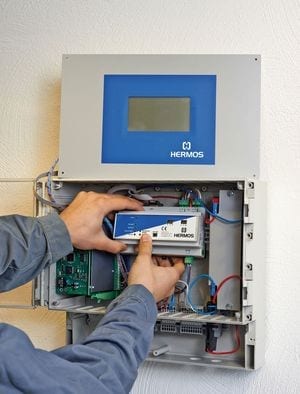Reliably Collecting Data from the Field
Aachen, November 2013: HERMOS Systems, a specialist in automation projects from Dresden, has now implemented systems for monitoring facility data at 250 distributed locations for a customer who is active throughout Germany. The data communications core of the system is Gesytec’s Embedded Box DELTA 1000.
HERMOS Systems recently commissioned the 250th facility monitoring system for a customer who has sites distributed throughout Germany. The company from Dresden delivered the first system for this project about two and a half years ago. At some of the sites there are as many as 50 LON network nodes installed. The data from these nodes is sent to a higher-level control system.
The LON communication node acquires digital and analog data from the LON network on site, such as status messages, data on downtime as well as operating and error messages, for example from elevators or escalators, display panels or lighting systems. This data is then sent by telephone or GSM to the central building control system (BCS) and security control rooms.
Gesytec’s Embedded Box DELTA 1000 is at the core of the communication with the higher-level control systems. It is freely programmable and offers two interfaces to CEA-709.1 compatible networks (LonWorks TP/FT) as well as an Ethernet port and a modem connection.
HERMOS has implemented its own application on the DELTA 1000 hardware platform, for instance, the processing, evaluation and transmission of the messages, the triggering of switching operations and automatic function tests – for example of the emergency lighting.
Robert Berndt, software developer at HERMOS, also sees the cost as well as the functionality: “For many projects, where relatively small quantities of data need to be sent from each site, we don’t need a high-end CPU for communication with the outside world. With the interfaces that the DELTA 1000 offers and with Windows CE, the DELTA 1000 is exactly the right platform for our applications. Especially for projects involving multiple sites and with a corresponding numbers of devices it has proved to be an economical solution – both in terms of our programming and the hardware cost.”
Dieter Schunk, CEO of Gesytec, sees the DELTA 1000 as a system that is particularly well-suited to widely distributed sites: “We developed DELTA 1000 for distributed plants, where high-end CPUs are neither needed nor economical. With this system we can offer our customers a reliable hardware platform that enables them to implement their applications simply – and first and foremost economically.”
Priority for data security
The DELTA 1000 uses cell phone or landline connections to communicate with the control systems, meeting very specific requirements for the reliability of the data acquisition, buffering and transfer of data, because the monitoring of distributed locations often involves safety-critical plant data: For example, the system warns of faulty system components, overheating, leaks and unauthorized access.
In such instances, data transfer reliabilty is an important aspect. Using algorithms specially developed for this system, the DELTA 1000 is able to detect disruptions or faults in the telecommunications system or a failure of the BCS. Furthermore, HERMOS has implemented additional functions to ensure that the system provides a high level of reliability. These functions include autonomous redial with ring tone and receipt recognition, automatic recognition of the availability of the control center as well as data transmission to a redundant BCS, which also has a redundant security control unit.
The DELTA 1000 monitors the status of all nodes in the LON network on site . As a remote network interface (RNI), it allows access to the LON network for remote maintenance as well as being used to download software and network data. The DELTA 1000 itself provides a browser interface for administration and configuration.
A 7” touchscreen panel can be connected to display error and operating messages as well as for operating and performing switching operations.
Background
Gesytec developed the DELTA 1000 primarily for use with monitoring and control systems that have to communicate with the outside world. It provides the platform that users can use their own software on.
The main features of the DELTA 1000 are:
- Data server for remote monitoring
- Connection to CEA-709.1 compatible networks
- Remote network interface for VNI and MIP applications
- Host controller in LonWorks networks
- Web server for configuration and diagnostics
The device software optionally includes an SQL database, a web server and a CEA-852-compliant LON/IP interface.
With a power consumption of less than 3 W the DELTA 1000 is also ideal for tasks which rely on keeping power consumption to a minimum, such as distributed systems that are powered by solar panels, for example, for which embedded PCs were out of the question in the past.

